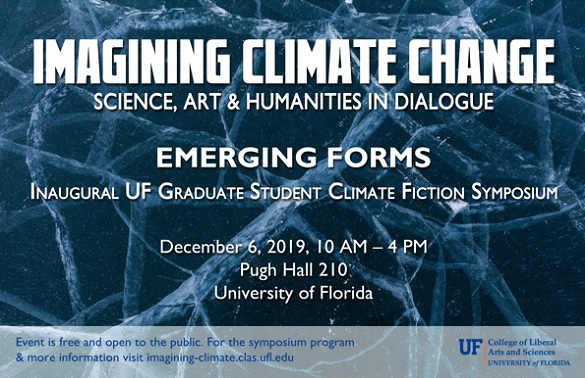
- This event has passed.
Emerging Forms – Grad Student Climate Fiction Symposium
December 6, 2019 @ 10:00 am - 4:00 pm
Free
“While it is clearly time to dismantle Anthropocene logic, there is no need to wait until the end of this world to begin to conjure livable ones. There are as yet other worlds in this world. And there are, as yet, worlds to come. But which worlds will be livable? And what makes a livable world?” – Natasha Myers
Our strategies for measuring the effects of climate change and for forecasting its impacts are not limited to the physical and social sciences.
Among humanities-centered responses to climate change are the emerging genres of climate fiction, –poetry, and –film, works of the creative imagination grounded in realities of planetary crisis, mass extinction, climate-induced migration, and economic collapse, and projecting futures in which our habits of mind and body will be challenged as never before. In thrall to the predatory hubris of Anthropocene logic, desperate and cruel imagined futures seem to forecast dire, inescapable fates. In contrast, imagined futures shaped by a resolve to see beyond the dark allures of ruin can give us hope: that we may find ways of being and living in reciprocity and resilience; that we may conjure, as Natasha Myers proposes, livable worlds before the end of this world.
This symposium’s presentations and readings by UF graduate students who are working across a wide range of literary, film, and poetic responses to climate change, will confront imaginative and ethical challenges of the diverse futures that are already upon us.
This event is free and open to the public. No advance registration is required. Sponsored by the Department of English and Imagining Climate Change.
Program:
9:30 – 10 AM – Light refreshments
10 – 10:10 AM – Introductory remarks
Terry Harpold, Director of Imagining Climate Change
10:10 – 11:25 AM – Altered landscapes
Andrea Medina (Moderator)
Amanda Rose, “No Stone Left Unturned: Environmental Catastrophe in J.G. Ballard’s The Day of Creation”
Jacob Hawk, “Capitalism Behaving Badly: Potential Pasts and Imagined Futures in Young Adult Climate Fiction”
Danielle Jordan, “Dreams Gone Awry”: Examining The Climate Crisis Through the Works of Ursula K. Le Guin”
11:30 AM – 12 PM – Poetry reading
Gardner Mounce (Introducer)
Ashley Kim, “Mycorrhizal”
12 PM – 1 PM – Lunch on your own
1 – 1:50 PM: Visualizing change
Ayanni Cooper (Moderator)
Bri Anderson, “Hello, My Name is Flying Garbage Monster: Eco-Education and the Hyperobject in Rachel Hope Allison’s I’m Not a Plastic Bag”
Luke Rodewald, “‘Our Place in the Dirt’: Slow Violence and the Cinema of Climate Change”
1:55 – 2:25 PM – Fiction reading
Gardner Mounce (Introducer)
Elizabeth Yerkes, “Paper Bullets”
2:30 – 3:20 PM – Overcoming inertia
Madeline Gangnes (Moderator)
John Mark Robison, “Climate Crisis and Weberian Disenchantment in the Medieval Worlds of George R.R. Martin and Brandon Sanderson”
Brandon Murakami, “(Against) Us-topia: Re-Envisioning the Biopolitical Ethics in George Turner’s The Sea and Summer and Bong Joon-ho’s Snowpiercer”
3:25 – 3:55 PM – Poetry reading
Gardner Mounce (Introducer)
Cheyenne Taylor, “The Long Emergency”
3:55 PM – Concluding remarks
Terry Harpold